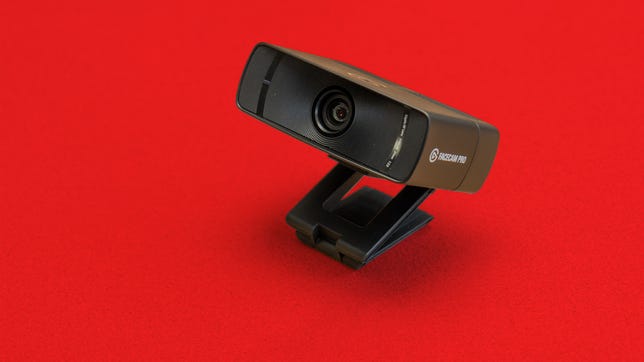 Why You Can Trust CNET
Why You Can Trust CNET Elgato Facecam Pro Review: A Streamer's 4K Dream
Elgato's 4K 60fps webcam is one of the top of its class, especially if you're a fan of Elgato's streaming-accessory ecosystem.

If you're a big user of Elgato's streaming-focused accessories, it will probably be hard to beat the Facecam Pro for a webcam in that ecosystem. It's designed to be closely integrated with those accessories, on both Windows and Mac, delivering up to 4K 60fps and a better-than-usual 1080p 60fps. It also offers a flexible amount of control over the camera settings. It hasn't bumped my 4K favorite, the Insta360 Link down our list of best webcams, but it's a strong runner-up for streamers and people who record their screens with a picture-in-picture self view, such as in training or prerecorded presentations.
Sadly, it's also priced like the Insta360 at $300, which seems to be the going rate for webcams in this class. But you're paying for better quality, greater flexibility and a more sophisticated feature set than you'd get with a cheaper option. That doesn't mean you won't be happy with a less expensive model, but if your image matters, it might be worth the investment. Like its 1080p sibling, the Facecam, the Pro doesn't have a built-in mic, but that makes sense given its target audience uses headsets or external mics.

Elgato Facecam Pro
Like
- Elgato Hub software has a solid set of camera controls
- In Windows, the app tells you if the camera's in use elsewhere and what's using it
- You can set zoom and focus presets in the app and save current settings to the camera
Don't like
- Expensive
- Annoying autofocus
- Autoexposure could use fine tuning
- Relatively big
- No lens cover
Elgato pitches its Facecams as the only webcams that work with raw files, but that's a little misleading. It does the signal processing in the camera rather than further down the imaging pipeline in your system, similar to raw files shot on phones. But webcams and phones have far smaller tonal ranges, and without the computational magic performed before it gets to what you think of as "raw," the output can be pretty ugly and hard to work with.
Elgato says it basically performs any 4K to 1080p downsampling at the same time for sharper results, at least in OBS and similar apps. I don't see any difference between its 1080p sharpness and that of other good 4K webcams, such as the Insta360 Link. But like those, its 1080p is definitely sharper than a straight 1080p camera and its zoomed-to-head-and-shoulders shots look better.
Because more of the processing takes place in the camera, you have a lot more control over the settings -- notably ISO sensitivity and metering in the Elgato Camera Hub software -- than you typically get. The metering at least makes the exposure a lot more predictable and accurate.
The Facecam Pro comes with a mount similar to that of most webcams, with the tilting center section that's become popular in recent models.
Image quality -- exposure, white balance and noise -- are quite good as well, even in dim conditions. Just don't zoom in too close in low light. Zooming in under good light still shows softness from the digital zoom processing.
And though you can select spot metering, it's always the center spot, which means if you move your head around a lot and you've got a contrasting background (like my pasty skin and black chair) it will adjust exposure when you don't want it to. It needs to be metered off your face. Center-weighted metering gives you more latitude, since it's essentially a bigger spot, but that can overcompensate.
Its autofocus, however, is not great. It's accurate but too aggressive, trying to adjust when it doesn't need to. The result is a lot of unnecessary and distracting pulsing.
In good light, the Elgato also has some of the best background masking I've seen. It uses the same engine that's in Nvidia Broadcast software, and it occasionally seems to even do a better job, with less of the annoying waffling around the edges. It does limit you to 10 still backgrounds (your own) as well as blur.
You use the Facecam Pro via the Elgato Virtual Camera, which behaved somewhat glitchily, at least with OBS. Sometimes it worked, sometimes it just gave me a frozen frame. But it's also smarter than Broadcast at knowing when the system has freed up the camera. And in fact, it's the only webcam app I can remember that tells you which application has the lock on it -- that's something they all should be able to do.
Elgato Camera Hub also lets you save up to four zoom presets, and they're smart enough to be linked to the field of view, so a given zoom provides the same view in 4K and 1080p. That's because it's always operating in 4K. There's no auto-framing, though, which I find tends to be meh in fixed webcams (as opposed to the robotic tracking models). You can set up to three focus presets, too, which it categorizes as Near, Mid and Far.
The Camera Hub software is better designed than many of the apps I've seen, but it's probably not ideal for people who just want to go all-auto, set it and forget it. They might be overwhelmed by all the options. It's still a little too glitchy, though, or at least sensitive to particular combinations of settings, which it keeps to itself.
I do like the Facecam Pro a lot more than the Facecam, but I wish it were a little smarter for the money. Those smarts can frequently be fixed -- or at least tweaked -- via firmware and software updates, so it may improve over time.

